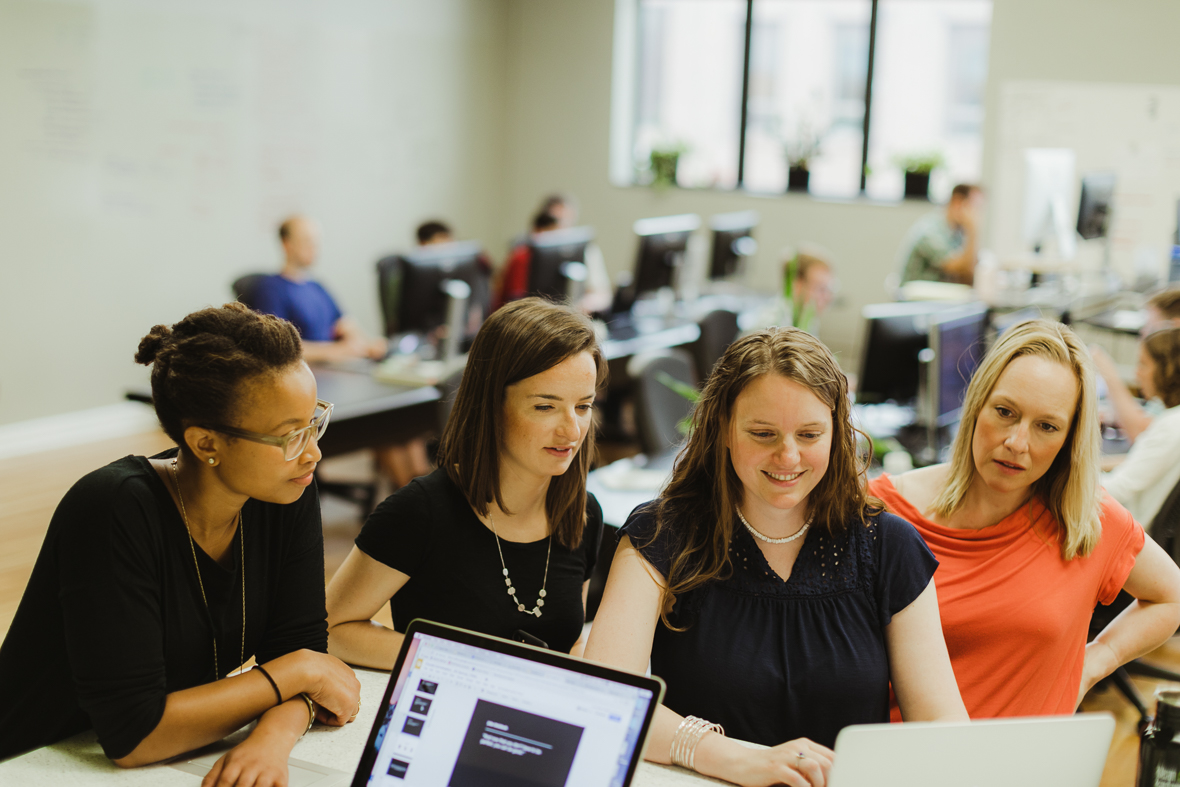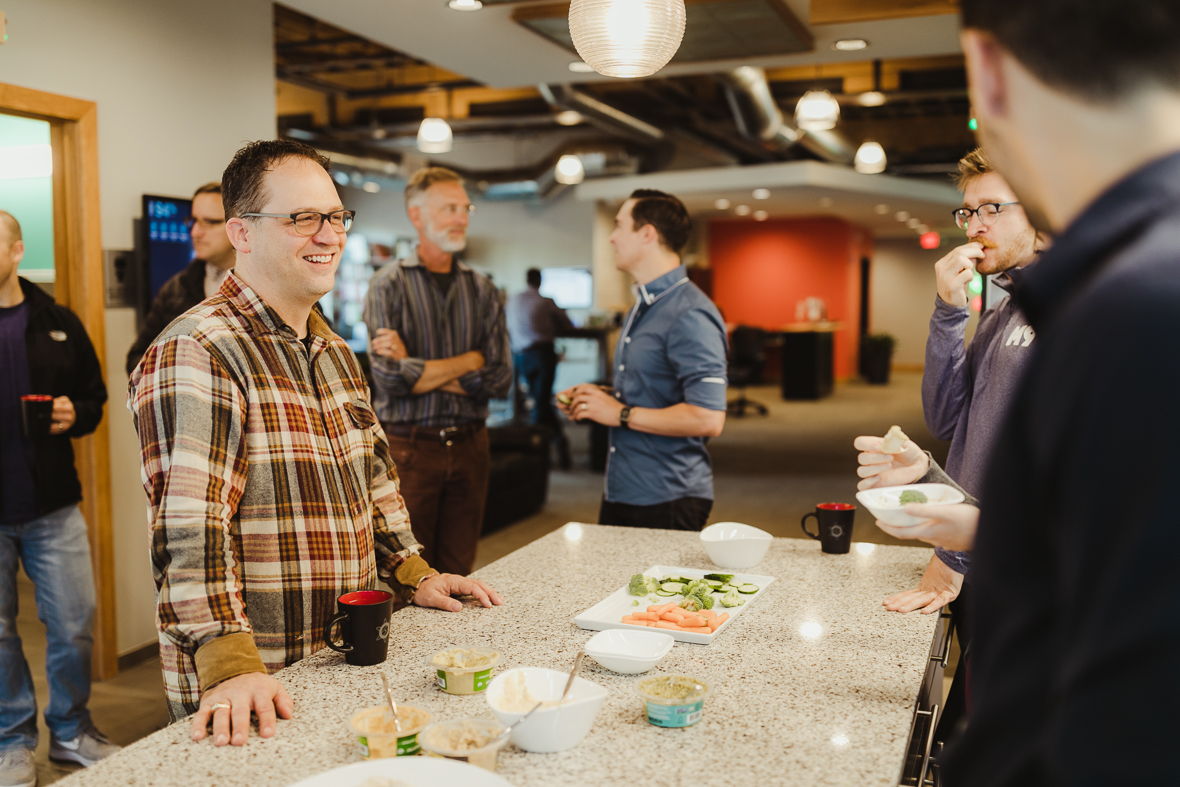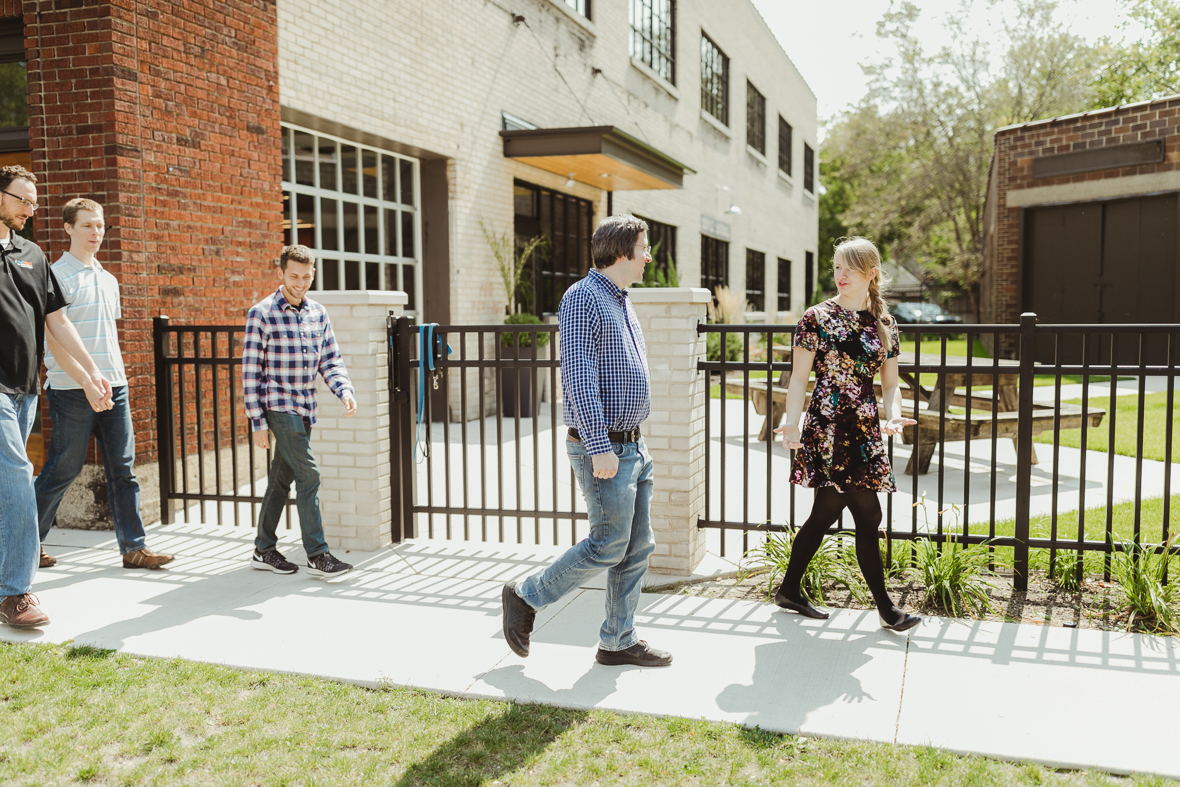This is the story of how our first non-technical employee helped Atomic Object, slowly but surely, build a culture that insists on good people skills for everyone.
When Mary O’Neill joined Atomic Object in the early 2000s, she was our sole woman and only non-technical employee (managing accounting and other operational business activity).
Back then, even more so than today, the business world characterized software developers as anti-social code jockeys, and software designers as “people who made interfaces pretty.” Few were expected to communicate well with clients, much less serve as consultants who help make strategic decisions and solve hard business problems.
Atomic identified the need for technical and people skills from its employees, but finding the right people was often tough.
Putting People-Sense to Work
By 2009, Atomic had developed its current interview process, which ends with a full-day interview. We’d gotten really good at figuring out who was technically competent to build great custom software. But Mary saw that we also needed to introduce a way to evaluate each candidate’s people/social skills.
“I invited myself to the interviewing process because I wanted to look specifically for the core competency skills around human interaction,” she said.
Drawing from past professional experience in workplace design and its focus on how teams work together, Mary felt well-suited to lead this new hiring practice.
“By virtue of the fact that I wasn’t a developer, I brought a different mindset and perspective,” she said. “And I have a really well-developed sense of people; it’s one of my ninja skills.”

Asking the Right Questions
Mary scoured the internet, business magazines, and books for interview question inspiration. She pulled together a series of questions that became the foundation for the “core competency” portion of Atomic’s full-day interview.
“I selected questions based on my own curiosity about how best to get to know people,” she said. “I’m always reading and trying to find more helpful questions to ask—my list continuously evolves.”
According to Mary, a good core competency interview question is one that prompts a candidate to talk openly about their skills and experiences, how they like to solve problems, how they relate with other people, and their perspectives on common teamwork situations. Conversely, a bad question is too specific (yes/no) or framed in such a way that the candidate is drawn to a concretely “right” or “wrong” answer.
“Good questions are open-ended, like, ‘Tell me a story about a time when you resolved conflict effectively within your team,’ a question that is framed in a way so that the interviewee expands on a specific experience they may have had, how they handled it, and what they learned from it,” she said.
Over time, Mary added other questions to the core competency interview document based on hard-won lessons after the company needed to correct a hiring mistake.
“In those cases,” said Mary, “I thought ‘What questions might we have asked that could have helped us get to know this person better, possibly preventing us from making that hiring mistake?’”
Nurturing an Interviewer Skill
Mary reflects that while she uses the interview to help determine if a candidate is right for Atomic’s culture, “culture fit” is subjective. Our core competency interview includes a series of questions that prompt a job candidate to articulate what is important to them in the company, team, and work environment they seek.
A lack of “right or wrong” answers to the questions can sometimes present candidates with a challenge. “A developer’s education and problem-solving focus may lead them to edge cases and answer precision—they may want to see the world in that way,” said Mary. “Some interviewees want to know they’re checking all the right boxes with their answers, and there can be some discomfort for a person who is not familiar with thinking about and answering open-ended questions.”
Though some wrestle with the open-ended nature of questions, Mary stressed that this dynamic isn’t meant to trip up a potential hire.
“I work hard to ask questions that invite candidates to conversationally talk about themselves, telling stories about their actual job experiences. I listen for authenticity, capacity to learn, confidence, humility—that stuff reveals itself as they talk,” she said.
In addition to picking up cues about a candidate’s skills and demeanor through their answers, Mary has learned to study body language.
“Eye contact is huge,” she said. “It can be as simple as, ‘If I asked you the question, you should be looking at me, not my interviewing partner, as you answer it.’”
All this attention to a candidate’s answers can be demanding for the interviewer.
“I am so focused on listening carefully, in three dimensions—words, body language, seeking to understand intent,” she said. “I enjoy the core competency interview, and it can be tiring.”

Measuring the Cultural Impact
These days, Mary’s responsibilities include managing Atomic’s finances, facilities, people operations, and a team of three. Still, she dedicates time to the core competency interviews for the majority of Atomic’s job candidates—dozens each year. And she partners with other Atoms to help them gain experience as core competency interviewers because ensuring that Atomic is building a team with strong core competency skills can make or break a project’s success for our clients.
“We are consultants after all, and this interview touches on the core competence of being excellent consultants, which goes well beyond a person’s technical skill in their craft,” she said.
Since most of Atomic’s job candidates interview for a software designer or developer role, Mary explained that we need to hire people who are good at consulting with clients, employing good listening skills and empathy, and demonstrating awareness of others and kindness.
“The core competency interview helps us hire good people—not just technically competent practitioners,” she said. “The success of our company to date has proven that hiring good people with strong social and technical skills has enormous value–for our clients as we solve hard problems and create great software products for them, and for each other as we build strong, trusting relationships. Atomic is a great place to work, where people care about each other and want to learn, grow, and have fun together.”
Looking back on the past decade, Mary commented that core competency interviews have helped shape Atomic Object.
“We can all look around our company and feel as good as we do about the people we work with as a direct result of our commitment to and trust in core competency interviewing,” she said.

